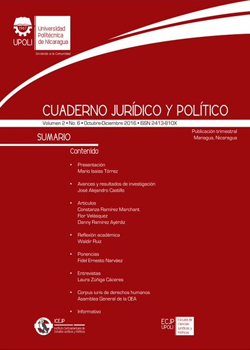Sandinista Nicaragua in the Face of Decoloniality as a Democratization Alternative for Latin America
DOI:
https://doi.org/10.5377/cuadernojurypol.v2i6.10977Keywords:
Decoloniality, eurocentrism, capitalism, Latin American states, popular democracy.Abstract
In this work the author reflects on the concept of decoloniality, as an alternative proposal of democratization for Nicaragua and Latin America. For the author, decolonization is the rethinking of the Latin American State as a popular space that leads to the construction of a political society that progressively pushes out of itself forms and mechanisms that are foreign to our realities -such as liberal democracy oligarchic- and bring us closer to more "our" forms of organization. So the Nicaragua led by Daniel Ortega has important tasks that, if not addressed from a critical perspective, would be placing the revolutionary process closer to a liberal and authoritarian court system and much further away from the decolonizing proposal of the first stage of revolution.
Downloads
257


 Cuaderno Jurídico y Político es de acceso abierto y permite la reproducción, la distribución y la comunicación pública solo para fines no comerciales
Cuaderno Jurídico y Político es de acceso abierto y permite la reproducción, la distribución y la comunicación pública solo para fines no comerciales 